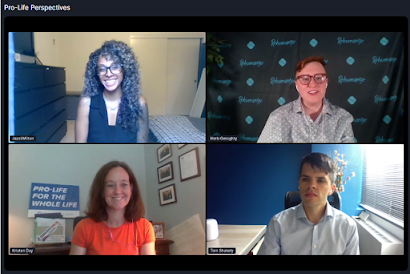Rehumanize Conference Recap
 |
| Rehumanize Conference speakers Jazzi Milton, Herb Geraghty, Kristen Day, and Tom Shakely |
Saturday’s Rehumanize Conference was incredible. The organizers did a terrific job pivoting to a virtual format. One happy side effect: the conference attracted attendees from most U.S. states and several other countries, including Germany, Japan, and Australia! For most, it was the first time they’d been able to attend. It was a great demonstration of radical inclusivity, which (as organizer Herb Geraghty reminded us) requires an examination not only of who we are working for, but who we are working with.
Rehumanize International’s executive director Aimee Murphy kicked it off with her argument for the consistent life ethic, rejecting the notion that human rights should be based on one’s innocence or usefulness. My favorite quote: “I constantly get asked how I approach the voting booth, and my answer is always: ‘With angst and trepidation.'”
The morning panel on police, prisons, and the death penalty was excellent. Zuri Davis, who reports on exoneration stories, prosecutorial misconduct, and prison abuses for Reason, talked about the legal doctrines that stand in the way of accountability. She urged us not to let criminal justice fade as an issue after November. Abraham Bonowitz of Death Penalty Action described his work bringing together the “voices of experience,” including wrongfully convicted people, former executioners, and the family members of both murder victims and death row inmates. Hannah Cox of Conservatives Concerned About the Death Penalty shared her insight that “support for the death penalty runs about a mile wide and an inch deep.” She works both with people who oppose the death penalty for moral reasons, and with those whose reasons are strictly practical. But the most impactful panelist for me was Miea Walker of Forward Justice, who shared the struggles she faced reintegrating into the community after serving a prison sentence. She is currently focused on COVID-19 decarceration efforts; her former cellmate died from the virus in May.
The next panel was “Pro-Life Perspectives.” Kristen Day of Democrats for Life of America had harsh words for her party’s destructive disregard of babies who are “unwanted.” Aside from being morally appalling, she argued that the party’s abortion stance is responsible for a loss of electoral advantage at the state level. She noted that the 2020 DNC was muted on abortion, especially compared to 2016: “They know it’s a losing issue.” Tom Shakely of Americans United for Life discussed long-term policy strategy. Jazzi Milton of Pro-Life San Francisco talked about her mission to extend her city’s welcoming reputation to the most vulnerable children in the womb. She declared: “If we can make San Francisco pro-life, the world will follow!”
I then attended a breakout session on feminism and the consistent life ethic, led by pro-life atheist Rachel Peller. Rachel shared stories from her time as a Birthright volunteer, including helping a woman escape an abusive relationship and observing that the vast majority of abortions are motivated by economic insecurity. Her desire to identify and address the root causes of abortion led her to pursue a degree in women’s studies. She gave an excellent overview of pro-life feminist traditions, noting that there has never been a single definition of feminism; we really have feminisms, and participants in feminist movements must adapt to challenge a variety of gender-based power structures.
Next up was Robert Saleem Holbrook of the Amistad Law Center & the Human Rights Coalition, who lost two cousins to gun violence. He also participated in a drug-related homicide when he was sixteen years old, for which he served 27 years in prison. Having been on both sides of the issue, he said “There’s no wall between victims and offenders.” He advocated moving away from harsh sentences like life without parole (which he calls “death by incarceration”) and toward approaches that get to the root of community trauma, arguing that we need not sacrifice public safety to do so. He also shared this excellent short documentary about women serving life sentences for crimes committed in their youth:
The next session I attended was Aimee Murphy’s breakout on sexual violence. She bravely shared the details of her own rape and trauma response, which I will not recount here. Suffice to say that she is a powerful advocate for educating people about consent from a young age.
David Swanson of World Beyond War spoke on the topic: “Can War Ever Be Just?” He answered in the negative. Much of his keynote was devoted to a discussion of World War II, since it is often cited as the prototypical just war. His argument was that the United States and other Allied countries had ample opportunities to prevent the Holocaust before World War II broke out, but failed by their racist refusal to accept Jewish refugees. The costs of war, particularly its opportunity costs, were also discussed.
Mikhayla Stover, who wittily described herself as an expert in “immigration policy and making people really depressed at parties,” provided a 101-style introduction to the disastrous history of United States interventions in Latin America. It is summarized in a three-part vicious cycle: (1) destabilization, e.g. sponsoring coups and promoting banana republics; (2) deflection of responsibility; and (3) detention of immigrants who cross the border into the United States. She also talked briefly about the narrowing paths to legal immigration and the rise of private prison companies.
Ismail Smith-Wade-El, an anti-racist advocate and local elected official, asked: “Do we love America enough to deal with racism in a meaningful way?” Doing so will require us to recognize forms of racism more subtle than slurs and burning crosses. He encouraged us to expand our horizons to include problems like gentrification, acknowledge internal prejudices (rather than claiming colorblindness), seek out perspectives different from our own, and actively intervene in racist situations as they are happening. He made the point that racist systems harm everyone, including white people, quoting Zora Neale Hurston: “Sometimes, I feel discriminated against, but it does not make me angry. It merely astonishes me. How can any deny themselves the pleasure of my company? It’s beyond me.”
John Kelly of Not Dead Yet gave a powerful keynote on ableism, euthanasia, and assisted suicide. He shared some startling statistics on the reasons people give for physician-assisted suicide; many are based on the ableist idea that dependence on others is humiliating, making issues like incontinence a fate worse than death. He connected this attitude to surveys showing that white, affluent, privileged people are the most likely to support assisted suicide, while people of color and other marginalized groups broadly oppose it. He lamented abhorrent media treatment of disability, from news coverage that identifies with parents who kill their autistic children, to movies like “Me Before You” promoting a better-dead-than-disabled narrative. All of this has been made worse by COVID-19, especially for people living in nursing homes. The case of Michael Hickson is the stuff of nightmares.
The final breakout I attended was a joint presentation on creative expression. Maria Oswalt of Rehumanize International focused on visual art, urging artists to carefully reflect on both the message and the medium. (Her prime example of what not to do? The infamous Pepsi/Kendall Jenner commercial.) Sarah Terzo of PLAGAL+ and Live Action took up poetry and fiction. She gave numerous examples of works with consistent life ethic messages, noting that science fiction is a particularly good way to humanize the “other” and expose the evils that logically follow from dehumanization.
And speaking of creative expression, the conference concluded with the annual Create | Encounter release party. You can check out all the winners and honorable mentions here, but if you only have time for one thing, make it this poem by our frequent guest contributor Acyutananda.



Leave a Reply
Want to join the discussion?Feel free to contribute!